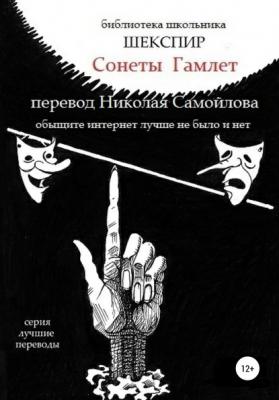Сонеты. Гамлет в переводе Николая Самойлова. Уильям Шекспир
Читать онлайн.| Название | Сонеты. Гамлет в переводе Николая Самойлова |
|---|---|
| Автор произведения | Уильям Шекспир |
| Жанр | Драматургия |
| Серия | |
| Издательство | Драматургия |
| Год выпуска | 2020 |
| isbn | 978-5-532-03965-0 |
And art made tongue-tied by authority,
And folly (doctor-like) controlling skill,
And simple truth miscalled simplicity,
And captive good attending captain ill:
Tired with all these, from these would I be gone,
Save that, to die, I leave my love alone.
66
Устав, взываю к Смерти: – Нет терпенья
Достоинство с рожденья в нищете,
Нарядное ничтожество в веселье,
И вера позабыта в суете,
И почесть воздают не по заслугам,
И добродетель век глумясь растлил,
И совершенство оболгали слухом,
И мощь правитель в немощь превратил,
И власть лишила голоса искусство,
И знаниями блажь руководит,
И дурью честность нарекло холуйство,
И зло добру прислуживать велит.
Устав так жить, ушёл бы раньше срока,
Боюсь любовь оставить одинокой.
67
Ah wherefore with infection should he live,
And with his presence grace impiety,
That sin by him advantage should achieve,
And lace itself with his society?
Why should false painting imitate his cheek,
And steal dead seeming of his living hue?
Why should poor beauty indirectly seek
Roses of shadow, since his rose is true?
Why should he live, now Nature bankrupt is,
Beggared of blood to blush through lively veins,
For she hath no exchequer now but his,
And proud of many, lives upon his gains?
O him she stores, to show what wealth she had,
In days long since, before these last so bad.
67
Зачем он должен жить среди пороков,
Украсив их присутствием своим,
Чтоб тяжкий грех, укрывшись от упрёков,
Себя связал ещё прочнее с ним?
Зачем цвет мёртвых красок подражает
Румянцу его щёк, он нежно ал,
Зачем обман уродство украшает
Его лицо, приняв за идеал.
Зачем он должен жить, когда Природа,
Растратив кровь давно уже банкрот,
Казна её всё меньше год от года,
Живёт лишь тем, что у него берёт?
Она хранит его, чтоб с пьедестала
Нам показать, чем раньше обладала.
68
Thus is his cheek the map of days outworn,
When beauty lived and died as flowers do now,
Before these bastard signs of fair were borne,
Or durst inhabit on a living brow;
Before the golden tresses of the dead,
The right of sepulchres, were shorn away,
To live a second life on second head;
Ere beauty's dead fleece made another gay:
In him those holy ntique hours are seen,
Without all ornament, itself and true,
Making no summer of another's green,
Robbing no old to dress his beauty new;
And him as for a map doth Nature store,
To show false Art what beauty was of yore.
68
Лицом мой друг похож на тех людей,
Когда краса жила и умирала,
Так, как сегодня цвет весенних дней,
Фальшивя, лбы живых не украшала;
Тогда ещё не стригли мертвецов,
Был локон достоянием могилы,
Наделав золотистых париков,
На голову не водружали милым.
Видна в нём благодать иных времён:
Прекрасное тогда не знало фальши,
Не убавляли лет, рядясь в бутон,
Не грабили людей слабей и старше.
Для верных, прежней красоте сердец,
Мой друг и был, и будет образец.
69
Those parts of thee that the world's eye doth view
Want nothing that the thought of hearts can mend;
All tongues (the voice of souls) give thee that due,
Utt'ring bare truth, even so as foes commend,
Thy outward thus with outward praise is crowned,
But those same tongues that give thee so thine own,
In other accents do this praise confound
By seeing farther than the eye hath shown.
They look into the beauty of thy mind,
And that in guess they measure by thy deeds;
Then, churls, their thoughts (although their eyes were kind)
To
